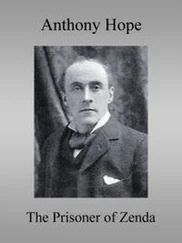THE PRISONER OF ZENDA
Anthony Hope
CONTENTS
Title Page THE PRISONER OF ZENDA Anthony Hope
History of Collins
Life & Times
Chapter 1 The Rassendylls—With a Word on the Elphbergs
Chapter 2 Concerning the Colour of Men’s Hair
Chapter 3 A Merry Evening with a Distant Relative
Chapter 4 The King Keeps His Appointment
Chapter 5 The Adventures of an Understudy
Chapter 6 The Secret of a Cellar
Chapter 7 His Majesty Sleeps in Strelsau
Chapter 8 A Fair Cousin and a Dark Brother
Chapter 9 A New Use for a Tea-table
Chapter 10 A Great Chance for a Villain
Chapter 11 Hunting a Very Big Boar
Chapter 12 I Receive a Visitor and Baita Hook
Chapter 13 An Improvement on Jacob’s Ladder
Chapter 14 A Night Outside the Castle
Chapter 15 I Talk with a Tempter
Chapter 16 A Desperate Plan
Chapter 17 Young Rupert’s Midnight Diversions
Chapter 18 The Forcing of the Trap
Chapter 19 Face to Face in the Forest
Chapter 20 The Prisoner and the King
Chapter 21 If Love Were All!
Chapter 22 Present, Past—and Future?
Classic Literature: Words and Phrases adapted from the Collins English Dictionary
Copyright
About the Publisher
In 1819, millworker William Collins from Glasgow, Scotland, set up a company for printing and publishing pamphlets, sermons, hymn books and prayer books. That company was Collins and was to mark the birth of HarperCollins Publishers as we know it today. The long tradition of Collins dictionary publishing can be traced back to the first dictionary William published in 1824, Greek and English Lexicon . Indeed, from 1840 onwards, he began to produce illustrated dictionaries and even obtained a licence to print and publish the Bible.
Soon after, William published the first Collins novel, Ready Reckoner , however it was the time of the Long Depression, where harvests were poor, prices were high, potato crops had failed and violence was erupting in Europe. As a result, many factories across the country were forced to close down and William chose to retire in 1846, partly due to the hardships he was facing.
Aged 30, William’s son, William II took over the business. A keen humanitarian with a warm heart and a generous spirit, William II was truly ‘Victorian’ in his outlook. He introduced new, up-to-date steam presses and published affordable editions of Shakespeare’s works and The P ilgrim’s Progress , making them available to the masses for the first time. A new demand for educational books meant that success came with the publication of travel books, scientific books, encyclopaedias and dictionaries. This demand to be educated led to the later publication of atlases and Collins also held the monopoly on scripture writing at the time.
In the 1860s Collins began to expand and diversify and the idea of ‘books for the millions’ was developed. Affordable editions of classical literature were published and in 1903 Collins introduced 10 titles in their Collins Handy Illustrated Pocket Novels. These proved so popular that a few years later this had increased to an output of 50 volumes, selling nearly half a million in their year of publication. In the same year, The Everyman’s Library was also instituted, with the idea of publishing an affordable library of the most important classical works, biographies, religious and philosophical treatments, plays, poems, travel and adventure. This series eclipsed all competition at the time and the introduction of paperback books in the 1950s helped to open that market and marked a high point in the industry.
HarperCollins is and has always been a champion of the classics and the current Collins Classics series follows in this tradition – publishing classical literature that is affordable and available to all. Beautifully packaged, highly collectible and intended to be reread and enjoyed at every opportunity.
Throughout literary history there have been many stories involving mistaken identity: Twelfth Night (c. 1601) by William Shakespeare, A Tale of Two Cities (1859) by Charles Dickens, The Prince and the Pauper (1881) by Mark Twain. Each of these examples uses the device in a different way, but it can almost be regarded as a genre. Sometimes it is used to heighten the sense of drama, at other times to inject an element of comedy. In The Prisoner of Zenda (1894) it is definitely the former, as it forms part of a counter-plot to prevent a king from being overthrown by his own brother.
In a fictitious land named Ruritania, the heir apparent, Prince Rudolph, is about to become king, but he is drugged by his brother Michael on the eve of his coronation. Two of Rudolph’s attendants persuade his visiting cousin, also named Rudolph and strikingly similar in appearance, to stand in for Prince Rudolph, thereby preventing Michael from claiming the throne. Meanwhile, Prince Rudolph is abducted and held captive in a town named Zenda.
While attempts are made to rescue Prince Rudolph, his double assumes the role of king in every sense, including in matters of love. He finds himself in love with Princess Flavia, and she him, though he is unable to reveal his true identity. As unlikely as it may seem, Flavia suspects nothing, such is the physical similarity between the two Rudolphs. Eventually though, Prince Rudolph is liberated and the truth comes out. Flavia and the stand-in are torn apart but realize that duty must come before their affection for one another.
Although Ruritania is the invention of the author, Anthony Hope, it is geographically situated on the Balkan Peninsula, in southeastern Europe. The name Ruritania is sometimes used to refer to a generic example country when academics are discussing economic and political models. It has also been used in a mocking sense to describe the quaint and simplistic Britain that exists only in the imagination of those deluded by deference.
The Prisoner of Zenda is one of a trilogy of works penned by Hope, also comprising The Heart of Princess Osra (1896) and Rupert of Hentzau (1898). All three novels were very popular at the time of their publication, although their appeal has waned over the passing century, largely due to their want of depth. Hope was more of a storyteller than a novelist. He lacked the kind of intellect required to layer his prose with meaning. The Prisoner of Zenda has fared slightly better than the other two books, simply because it is a better yarn and has one of those titles that people remember, regardless of whether they have read the book. It has been frequently referenced and adapted for both the stage and screen a number of times, too.
The Prisoner of Zenda is perhaps best seen as children’s fiction rather than adult. The mistaken identity plot – much like those tales where the beautiful female love interest dresses like a boy and is readily accepted as such – stretches credulity to breaking point, demanding that we suspend our disbelief. To the adult reader it may seem preposterous, but the device works well for the less dissecting mind of a child.
Hope himself was a go-getter. He used a vanity press to get his first book published and kept on trying until he eventually scored a hit with The Prisoner of Zenda . He might be thought of as a prototype for thriller writer Jeffrey Archer (albeit without the scandal), for he also dabbled in politics and managed to secure a title for his efforts writing propaganda during the First World War.
He wrote many other stories but none was ever as successful as The Prisoner of Zenda . Like Archer, he treated his books as products, with the express intention of using them to generate income. This included his own stage adaptations. He wrote for the market which already existed, rather than for serious literary expression, which hopes to find an eager readership available.
Читать дальше












